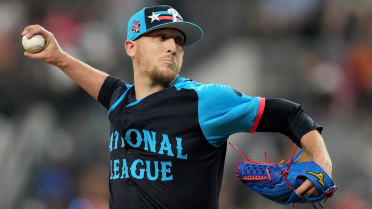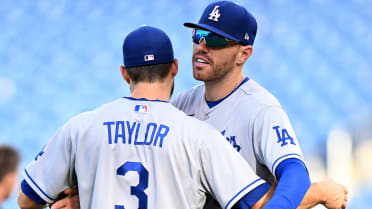Dark knife: Harvey's great 8 has cruel twist
Collins 'won't be sleeping much' after fateful ninth-inning decision
NEW YORK -- "No way! No way!"
That's what television cameras showed Matt Harvey saying to Terry Collins when the Mets manager went to pull Harvey after eight shutout innings in Game 5 of the World Series on Sunday night. Collins not only heard him -- not to mention the fans at Citi Field who were chanting his name -- but he acquiesced to him by abandoning the plan drawn up when things were much more quiet.
It was the move of a young manager, not a 66-year-old who had been preparing for this moment all his life. But would you have done it differently? Would Bobby Cox or Tony La Russa have done it differently?
:: World Series: Mets vs. Royals coverage ::
The Mets led by two runs and were three outs away from sending the Fall Classic back to Kansas City. Collins couldn't bring himself to pull Harvey until after a leadoff walk of Lorenzo Cain and a double by Eric Hosmer, and the game unraveled from there.
"When you looked in this kid's eyes, when he came off that inning -- and I mean, he's been through a tough summer; he's been beaten down -- and I just trusted him," Collins said after the 7-2, 12-inning loss. "I said, 'You got it. You've earned this. So go get 'em.' So it's my fault. It's not his."
Collins' plan called for him to bring in closer Jeurys Familia to start the eighth inning if Harvey could go seven with a lead. But Harvey was turning in one of the best starts ever when a team had its back against the wall in the World Series.
Harvey had struck out nine and allowed only four singles, and as a bonus, he had only thrown 93 pitches through seven innings. Collins stuck with him for the eighth, and he worked a perfect inning, throwing only nine pitches. Harvey's game score had climbed to 81, putting it barely behind the epic seventh games from the Dodgers' Sandy Koufax in 1965 (88) and the Twins' Jack Morris in 1991 (84) among the best performances in World Series elimination games.
After the eighth, Harvey was at 102 pitches for the game, 216 innings for the year and was desperate to work a 217th inning.
Yes, this was the same Tommy John survivor who had said 180 innings would be all he could go in his first season back from surgery. But this certainly wasn't a selfish guy looking to protect himself. Fans were chanting Harvey's name, and nothing about the moment was lost on the 26-year-old.
"It was hard for me to leave in a situation like that," Harvey said. "We're up two runs and kind of cruising through the game. It's one pitch here, and it's a different ballgame. [The fans] were awesome, they've been awesome all year out there. I had so much fun tonight. The energy was incredible."
Collins said afterward that he went to Harvey and told him, "That was enough." But Harvey convinced him to let him finish what he started.
Here was their conversation, as Collins recounted it.
Harvey: "I want this game. I want it bad. You've got to leave me in."
Collins: "Matt, you've got us exactly where we wanted [you to get us]."
Harvey: "I want this game in the worst way."
Collins: "Go get 'em out."
Neither of them will ever forget that conversation. Nor will Mets fans, who had been pulled along on one of the wildest rides in the franchise's history, beating the Dodgers and the Cubs before running into the Royals.
"Obviously I let my heart get in the way of my gut," Collins said.
Familia, who had blown saves in Games 1 and 4, each time when Collins turned to him in the middle of an inning after another pitcher had created a jam, was ready out in the right-field bullpen. But Collins stuck with Harvey after Cain had battled back from a 1-2 count to work a walk and, after Cain stole second, Hosmer drove an opposite-field double to left. That's when he turned to Familia, who would become the first closer to blow three save chances in one World Series.
"If you're going to let him just face one guy, you shouldn't have sent him out there," Collins said. "When the double hit, that's when I said, 'I've got to see if we can get out of this with only one run.' And it didn't work. It was my fault."
Coming in with the tying run on second and no outs, Familia retired the three hitters he faced in the ninth. But Hosmer went to third on Mike Moustakas' grounder to first baseman Lucas Duda and scored the tying run when Duda threw wild to the plate after David Wright had gotten an out at first on Salvador Perez's soft grounder in front of him.
Hosmer took a gamble that paid off, unlike the one that Collins took by managing with his heart, not his head.
"I know better than that," Collins said about sticking with Harvey over Familia. "I know that he wants the ball. ... We got in the spot where we wanted to get to, and we talked about it all day yesterday and all day today. This was my fault."
Harvey, on the other hand, didn't second-guess anything except the result. He says he'd do it all over again.
"I would ask for the ball every time," Harvey said. "Going into the ninth, I felt great. My mechanics, everything was right where I wanted it to be. As a competitor and a person, I always want the ball. That's what I've said all year long. In this situation, I wanted the ball. Unfortunately, it just didn't work out."
Collins will be haunted by the decision. That's what happens when things go wrong in games that are dissected over and over, with no statute of limitations on disappointment.
"Sometimes you let your heart dictate your mind," Collins said. "I've got one of the best closers in the game. I got him in the game, but it was a little late. And that's inexcusable, for me. Matt will tell you different because he's a tremendous human being. He's going to say how he wanted to be out there and should be out there. [Pitching coach Dan Warthen] said the same thing: 'He's throwing the ball great.' But if you put Jeurys in [and] he would've gave up the two runs, [people would have said], 'Well, you should've left Harvey [in].' I know how it goes."
Collins knows something else, too.
"I won't be sleeping much the next couple of days," Collins said. "I'll tell you that."
Phil Rogers is a columnist for MLB.com.



